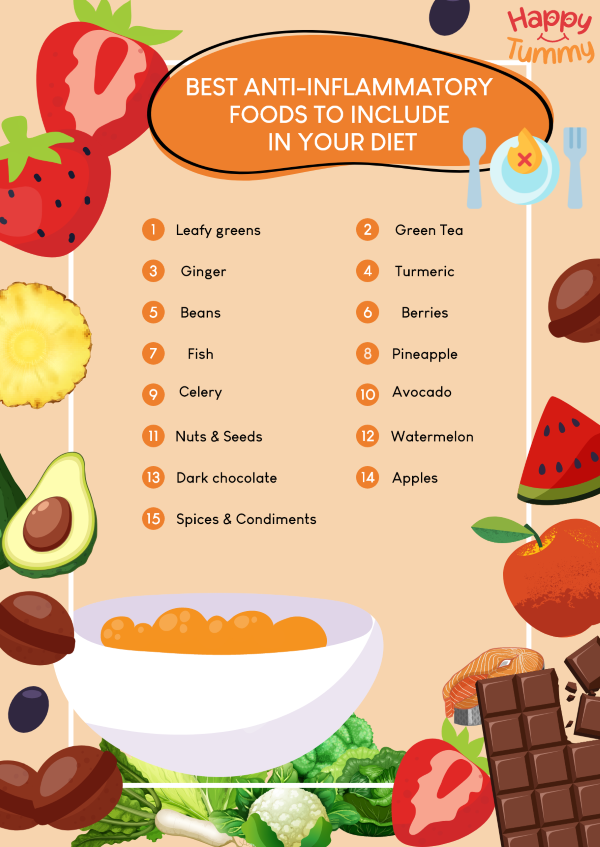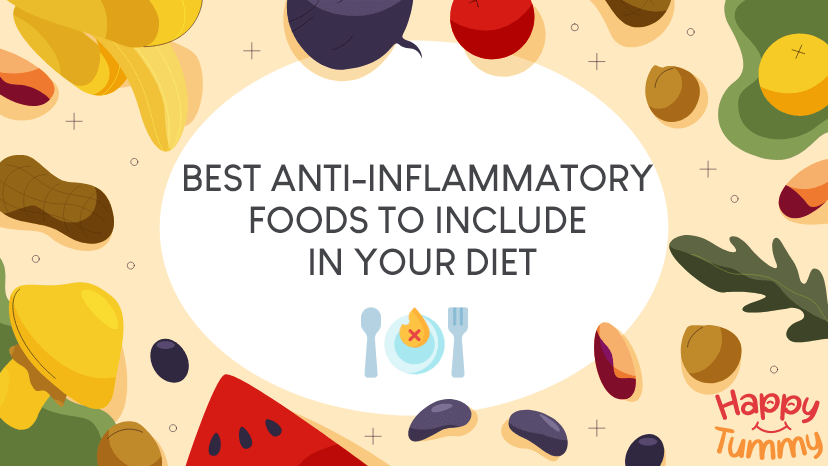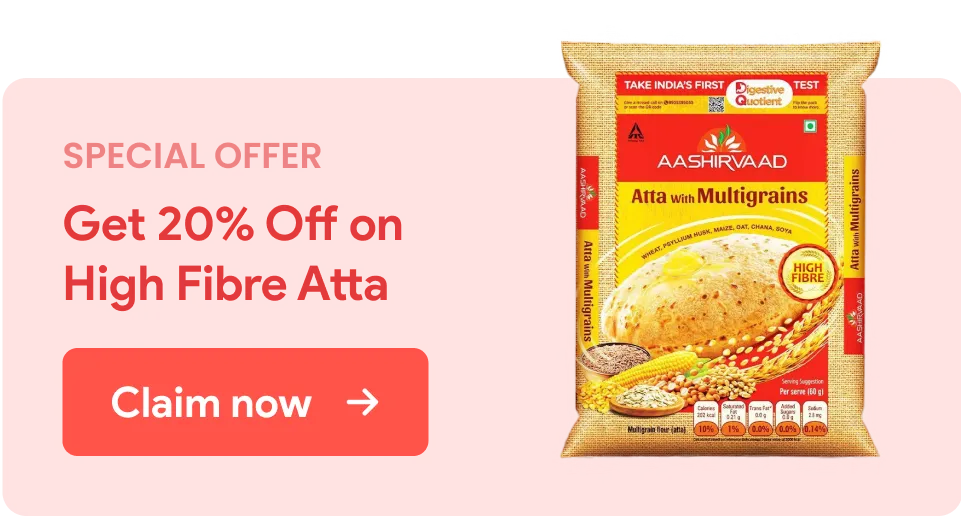Table of Contents
Our food choices have an impact on our bodies, and poor dietary choices may be the reason for inflammation. Focusing on a healthy diet is crucial to overcoming this. Certain foods may trigger or worsen inflammation, but the good news is that we may manage it with dietary modifications.
Adopting an anti-inflammatory diet is crucial since it may provide significant advantages. This strategy places a strong emphasis on eating foods might help reduce inflammation and avoiding items that do the opposite.
Read on to learn about the most effective anti-inflammatory foods to incorporate into your diet for optimal health and wellness.
Anti-Inflammatory Foods
Several of the most prevalent chronic illnesses might happen because of chronic inflammation [1]. Although there are many contributing factors to these illnesses, one important strategy to control and avoid chronic inflammation and disease is through food.
Every time we eat, we have the choice to select foods that either cause inflammation in the body or reduce it. Simply put, some foods contribute positively to general wellness, and some might have a negative impact.
Sugar items, processed foods, canned foods, industrial seed oils, alcohol, red meat, and refined carbs are a few examples of foods that might cause inflammation.
Anti-inflammatory foods consist of those foods that are unprocessed and unadulterated in any way. They are good because of their nutritional content and favourable effects on the cardiovascular, immunological, and overall health of our bodies and brains.
To help you get started, here’s a list of foods that reduce inflammation. Consuming these foods regularly may help you manage inflammation:

#1 Leafy greens
A rich source of antioxidants, vitamins, and minerals, leafy greens may help reduce inflammation. For instance, vitamin E, & Vitamin C may help lower inflammation and is found in green leafy vegetables like broccoli, kale, and spinach[2]. It has also been demonstrated that the vitamins A, D, and K found in other leafy greens might reduce inflammation [3].
Alpha-linolenic acid is an omega-3 fatty acid that is abundant in leafy greens and has anti-inflammatory properties [4]. More nutrients are present in leafy greens with a darker tint. Kale (काले), and spinach (पालक) are some foods strong in antioxidants.
Leafy greens are fun and adaptable to your diet; you may sauté them as a side dish, combine them into smoothies, or add them to salads. Their high fibre content helps to keep blood sugar levels steady and supports digestive health.
By integrating leafy greens into your meals daily, you may take advantage of their many health benefits, which include lowering inflammation and promoting general wellness.
According to the ICMR ( Indian Council of Medical Research) for men and women, it is recommended to include 100g of green leafy vegetables as a part of your daily balanced diet.
#2 Nuts
Nuts include omega-3 fatty acids, flavonoids, and phytonutrients, which may have anti-inflammatory effects. Additionally, they are high in magnesium and vitamin E, so some nuts may help reduce inflammation [5].
Almonds, for instance, provide magnesium, which may control the expression of genes that produce inflammation.
Omega-3, which has anti-inflammatory qualities, is abundant in walnuts. Other nuts like cashews, pecan nuts, almonds, and peanuts may also have anti-inflammatory qualities. Nuts go well with salads, whole-grain foods, and pesto. You may eat them raw, roasted, or cooked.
But because they are high in calories, watch how much you eat. According to ICMR, the recommended daily intake of nuts and seeds is 35g.
Including seeds in your diet, such as flaxseeds, chia, pumpkin, and sunflower seeds, can help lessen inflammation. Omega-3 fatty acids, antioxidants, and other nutrients with anti-inflammatory qualities abound in these seeds.
Seeds also contain antioxidants, such as vitamin E, which fight inflammation and oxidative stress. Many seeds provide an even distribution of omega-3 to omega-6 fatty acids, which supports an enhanced healthy inflammatory response [6].
#3 Ginger
Ginger has many benefits other than just taste. The natural ginger root ingredient gingerol promotes gastrointestinal motility, or the speed at which food leaves the stomach and moves through the digestive system [6]. Consuming ginger might promote quick digestion, shortening the time food takes in the stomach.
Antioxidants in ginger might help the body manage free radicals, substances that may harm cells when they multiply excessively and promote overall health.
These ginger properties may also help strengthen your immune system and reduce inflammation.
Peel, chop, and add to salad dressing, subji, curry, bread, or tea.
#4 Green Tea
Green tea is a widely consumed beverage renowned for its strong anti-inflammatory qualities. Potent antioxidants known as catechins, especially epigallocatechin gallate (EGCG), may help lower inflammation and shield cells from harm [7]. These antioxidants fight against free radicals, which might cause aging and inflammation.
In addition, green tea might help maintain a healthy gut flora balance, which is vital for immune system performance and inflammation control.
Choose good quality, organic green tea and prepare it correctly to preserve its antioxidant content if you want to reap its most health advantages. Check the whole Aashirvaad Organic Range to boost the nutrient value of your meals!
Incorporate green tea into smoothies or iced drinks for a cool twist, or drink it as a calming beverage all day long. But it’s important to limit caffeine consumption, particularly for people who are sensitive to it.
#5 Beans
High in fibre and phytonutrients, beans like lentils, black beans, red kidney beans, and chickpeas help to lower inflammation [8]. They are low-glycemic carbohydrates and affordable, high-quality source of protein—especially for vegans and vegetarians.
Try to consume 1-2 cups (approximately 60 g) of beans twice a week.
#6 Turmeric
The golden-yellow spice turmeric is well known for having strong anti-inflammatory effects. It possesses a substance called curcumin that has been researched to potentially lessen inflammation by stopping the body’s inflammatory pathways [9].
Curcumin has strong antioxidant properties that counteract free radical damage and save cells from harm. Use turmeric in your cooking to add it to stir-fries, rice dishes, soups, and curries to add to your diet.
In addition, you may combine turmeric with warm milk and other spices like cinnamon and ginger to make a calming golden milk or tea.
#7 Fish
Fish is a fantastic source of good fats and protein. The best sources are cold-water fish, rich in omega-3 fatty acids that reduce inflammation. They are also known as salmon, tuna, sardines, herring, and anchovies [10].
Essential fatty acids, particularly omega-3s, are abundant in salmon. Studies indicate that omega-3 fatty acids may help reduce the risk of chronic disease by reducing inflammation [12].
Consuming three to four ounces (80 to 100 grams approximately) twice a week reduces exposure to heavy metals and lowers this risk. If you have an inflammatory condition or would like to prevent one, include a high-quality fish oil supplement (if you are taking medication, consult your pharmacist first).
#8 Berries
Raspberries & Blackberries are good sources of vitamin C, and folate as well. They contain antioxidants such as bioflavonoids, and anthocyanins which have various health benefits, such as anti-inflammatory properties.
Blueberries contain quercetin, an antioxidant with potent anti-inflammatory effects, and are particularly powerful [13].
A cup of sliced strawberries has 98 milligrams of the vitamin C. According to the FDA, that’s nearly 100% of the recommended daily vitamin C intake [14].
Although vitamin C has many advantages, eating enough is especially crucial for healthy immune system operation since inflammation results from an overworked and stressed immune system. This way, the loaded vitamin C in strawberries make it a good option as an anti-inflammatory.
By preventing free radicals from causing damage to cells and igniting fresh inflammation, the antioxidant vitamin additionally provides extra benefits against inflammation.
#9 Celery
Rich in antioxidants known as flavonoids, fibre, and potassium, celery is a potent anti-inflammatory vegetable. Celery leaves have a good amount of vitamin C, beta carotene, and iron, which might support your immunity and overall health. You can add chopped celery to salads, salsa, or soups. You can also add it as one of the ingredients for stuffing in sandwiches and burgers. [15].
#10 Pineapple
Pineapple’s anti-inflammatory qualities result from its abundance of vital minerals and nutrients. One hundred gms of pineapple has 47.8 mg of vitamin C, which means eating a serving of fresh pineapple chunks may provide approximately 131% of your daily vitamin C requirement [14]. Thus, it may be a powerful antioxidant that boosts immunity and lowers oxidative stress, which may help control inflammation.
In addition, manganese, a mineral that promotes the creation of connective tissue and joint health, is abundant in pineapple, which adds to its general anti-inflammatory properties. So, because of its many minerals and nutrients, pineapple may be an excellent complement to a nutritious diet for reducing inflammation and enhancing general well-being.
#11 Dark chocolate
Cacao beans are packed with antioxidants and nutrients[15]. Dark chocolates also contain bioactive components such as polyphenols, flavonoids, procyanidins, theobromines, etc, and vitamins and minerals) that positively modulate the immune system as well.
However, chocolate should be processed as little as possible if you eat it for health reasons. Want to snack on chocolate? Try a square of dark chocolate that contains at least 70% cacao.
#12 Watermelon
Watermelon is a popular summertime sweet and juicy treat, but its nutritional benefits are hardly discussed. One of the few foods that contain lycopene, a potent substance that gives watermelon its pink-red color and shields the body from harm caused by free radicals, is watermelon [17]. The antioxidant property of watermelon makes it an excellent anti-inflammatory food.
You may eat watermelon raw as a light snack, puree it into smoothies and juices, or add it to fruit salads. Especially in the summer, it’s a tasty and refreshing way to add anti-inflammatory ingredients to your diet. But keep in mind that because it contains natural sugar, you should only eat it in moderation.
#13 Apples
Apples are rich in fermentable pectin ( a type of fibre), which might support good digestive health[19]. Good bacteria in the gut require pectin as a food source to increase and expand.
These fibres, sometimes called prebiotics, can alter the makeup of gut microorganisms. By doing this, the gut lining strengthens and helps block the entry of inflammatory substances into the body [19].
Sometimes, you may find it difficult to plan healthy meals and always look for strategies to increase your fiber intake. But wonder who to counsel and how to approach it.
Well, fear not, folks—Aashirvaad Atta with Multigrains and a team of trained nutritionists have created the My Meal Plan test, which may determine your daily fiber intake and provide you with a comprehensive meal plan that complies with recommended intake.
So just click the link to start taking advantage of it.
#14 Avocado
Strong antioxidants in avocados, such as vitamin E, support the body’s defences against oxidative stress and inflammation. Rich in monounsaturated fats, fibre, vitamin E, and carotenoids, the creamy fruit helps reduce inflammation in the body as a whole[20].
They also offer a rich supply of potassium, fibre, and other vital vitamins and minerals that promote the immune system and general health. Savour avocados for their creamy texture and increased nutritional value when sliced on toast, added to salads, or mixed into smoothies.
#15 Herbs / Spice / Condiments
Some spices are excellent for flavoring meals and have anti-inflammatory qualities. Garlic, ginger, turmeric, cinnamon, cloves, and chili pepper are a few of these[21]. They may be taken as a supplement or added to meals as touches, marinating, sauces, and salad dressings.
ITC believes that eating a balanced diet is essential to leading a healthy lifestyle. Schedule a 45-minute consultation with our experienced nutritionist to get a personalized nutrition plan designed just for you.
Making an appointment with the nutritionists and dietitians is all that is required. You may then meet the dietician virtually and ask any queries related to inflammation or any other health concern.
Anti-Inflammatory Diet Recipe
Recipe 1: Healing Turmeric Vegetable Soup
Heat two tablespoons of olive oil in a big pot over medium-high heat. Cook the chopped onions, sliced carrots, and sliced beets for approximately five minutes or until the veggies soften.
Add the minced garlic and three tablespoons of ground turmeric, and simmer for a further two to three minutes to bring out the flavours of the spices. Then add 3–4 cups of chopped spinach or kale, diced tomatoes, and other frozen veggies. Add 1/2 teaspoon sea salt, 1/2 teaspoon freshly ground pepper, and one chili pepper flake to the soup for seasoning.
Toss to mix in all the ingredients thoroughly. Add water as per the consistency you require. To help the flavours combine, place a lid on the pot, lower the heat to a simmer, and let the soup simmer for 20 minutes. Enjoy the nutritional advantages of this therapeutic turmeric vegetable soup while it’s hot.
Recipe 2: Anti-Inflammatory Berry Smoothie
Get your ingredients ready for a berry smoothie that will help fight inflammation. In a blender, put 1/2 cup dairy-free milk. Stir in 1/4 cup frozen cherries (make sure the seeds are out) and 1/2 cup frozen blueberries, raspberries, and strawberries.
You may add 1/2 frozen banana for sweetness and creaminess. Combine all ingredients in a blender and process until smooth and creamy. If necessary, adjust the consistency by adding extra milk. The mixed berries in this colourful and delectable smoothie are a powerful source of antioxidants with anti-inflammatory properties.
Savour this hydrating and nourishing berry smoothie for breakfast or as a nutritious snack to help your body’s natural anti-inflammatory defences.
The Bottom Line
Even low levels of inflammation on a chronic basis may lead to disease.
Try to manage inflammation by including a diverse range of delicious, high-antioxidant foods as a part of your daily balanced diet. Increase your intake of anti-inflammatory substances by eating foods as close to their natural state as possible and selecting a range of meals with vibrant colours.
Frequently Asked Questions
A. The five cardinal signs are redness (rubor), swelling (tumour), heat (calor; limited to the extremities of the body), pain (dolor), and loss of function.
A. Every individual has different metabolic functions, and how one’s body reacts to a particular food also varies.
Your outcomes may differ depending on how severe your inflammation and intolerance are. Dietary changes take time to reflect as your body requires sufficient time to adapt to the changes to show results. being consistent is the key.
Try to include these supper beneficial anti-inflammatory foods regularly in your daily balanced diet to see the results you are expecting.
Building a balanced, health-promoting diet may help minimize the risk of inflammatory diseases and improve your overall well-being, even though no meal will eliminate inflammation.
A. Chronic inflammation may induce internal scarring, tissue death, and damage to the DNA of previously healthy cells.
Left untreated, it may also harm healthy cells, tissues, and organs. In the end, this may result in the emergence of potentially fatal or severely incapacitating lifestyle diseases like Type 2 diabetes, hypertension, etc.
A. Chronic inflammation may result from the overstay of inflammatory cells. Your healthcare practitioner may advise medication or at-home care. Eating foods that are anti-inflammatory and practicing stress management may help reduce inflammation.
A. A diet heavy in processed foods, additives, and preservatives can cause inflammation. Likewise, food items high in sugar, saturated fats, salt, and alcohol are frequently linked to inflammation.















